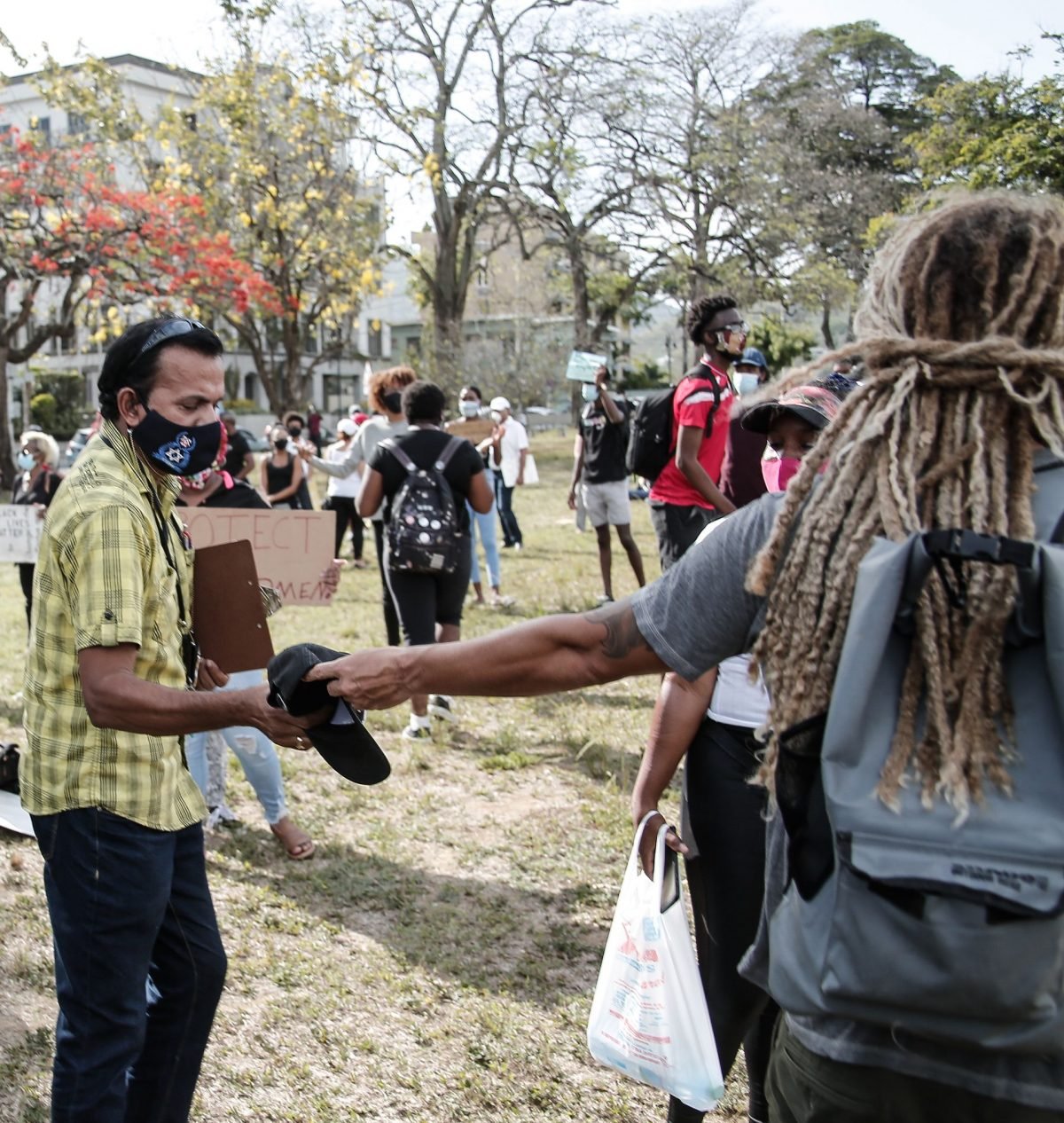(Trinidad Guardian) “I am bipolar. I am sorry.”
This was the apology offered yesterday by Ian Smart for pulling a cap off a policeman’s head during the Black Lives Movement protest in Trinidad and Tobago at the Queen’s Park Savannah on Monday.
Smart is the son of former attorney general Anthony Smart, the current chairman of state-owned bank First Citizens, and is the managing director of Smart Energy Limited and head of the non-profit organisation We Green Army.
Monday’s mostly peaceful protest was marred by the incident involving Smart that took place after protesters confronted a police officer who was videotaping the demonstration, saying he could not film the proceedings without their permission.
While the policeman faced off with a female protester, Smart grabbed the officer’s cap off of his head and raised his middle fingers at him before running away.
The situation was eventually diffused by Commissioner of Police Gary Griffith who was present at the time.
Guardian Media contacted Smart yesterday to find out what sparked the confrontation.
“That police officer was filming us without our consent. He was very intrusive, he could have come there in plain clothes with a cellphone camera and filmed and it would not have been seen as obtrusive,” Smart said.
“But he came there in his police uniform with a big stinking camera, barged into the crowd, into the centre really being intrusive. So I didn’t want to be filmed for whatever reason, next thing they use that film against me and this thing is that they are gathering intelligence.
“So we asked him to stop filming, he didn’t want to stop filming so I said if you want to take footage of my body without my permission then I am going to take your hat without your permission and that’s what I did. It was a tit for tat.”
Smart said he felt his actions, in turn, sparked a conversation that needed to happen.
“That sparked a tremendous amount of social media conversation across Trinidad and the diaspora about what is the definition of freedom of privacy, and who can be filmed, and when and where,” he said.
Smart was previously involved in a one-man protest against Rituals Coffee House three years ago.
He said both actions stemmed from his illness.
“I want to come out of the closet to the public about my illness and explain that race things tend to trigger my illness,” Smart said.
“The events that are taking place in Trinidad are stressing me out and it starts the beginning phase of the illness.”
Also contacted yesterday, however, activist Muhammad Muwakil, who was one of the organisers of the demonstration, condemned Smart’s actions. Muwakil said while he became angered by the policeman’s attempt to film the protesters against their will, he would not have resorted to violence of any type.
“We had no intention of approaching the police and becoming violent. So I condemn his (Smart’s) actions outright,” Muwakil said.
“There are some people who are selfish and take their own satisfaction over the rightful agendas of the people who have gathered. The agenda was never to provoke the police.”
Muwakil also expressed his disappointment that Monday’s demonstration had become overshadowed by the brief confrontation.
Meanwhile, Police Commissioner Gary Griffith said yesterday that he was willing to give Smart an opportunity to explain himself after being told that Smart had told Guardian Media he was suffering from a mental illness and wanted to apologise.
“We were going to find him but we look forward to seeing him tomorrow (today),” Griffith told Guardian Media in a telephone interview.
He said Smart can present himself to any police station to give his side of the story.
However, Griffith said Smart’s actions could have had serious consequences.
“His actions were very foolish, they could have caused many repercussions. His parents should have reconsidered his Christian name and instead of calling him Ian they should have called him Not Very and kept the same surname,” Griffith said.
Earlier in the day during the weekly police press briefing, Griffith also addressed the issue.
“We are meeting with that individual, we are going to have a nice conversation with him, it does not mean, every situation is different, it does not mean as soon as we find this individual he will be arrested but we are looking forward to having a nice conversation with him,” he said.
Griffith said while the TTPS is flexible, it will not condone any such actions in the future.
“Empty vessels make the most noise. Some of those screaming and shouting, they really were only there for confrontation and it will totally diminish the value of what they are there for but we are not taking that bait,” Griffith said.
He said the TTPS had granted permission for up to five people to take part in Monday’s protest but the numbers eventually climbed significantly and the situation became tense.










